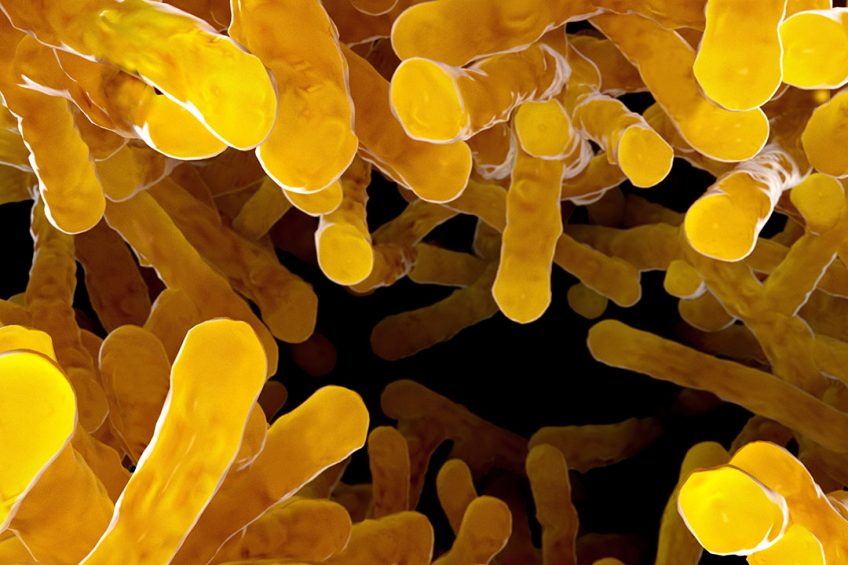Bacillus subtilis for an improved microbiota

Managing gut health is key to allow poultry to express their full genetic potential. Any compromise to gut health has a negative effect on both overall health and bird performance.
Gut health can be described as the symbiotic relationship between the host and its microbiota. The interactions between the microbiota, mucosal barrier, immune system and redox balance have recently been proposed for healthy, pre-disease and disease states. If there is an imbalance in these interactions, inflammation will occur – leading to ‘leaky gut’ (increase of the permeability of the intestinal barrier) and other gut-related disorders. Probiotics are used in poultry nutrition to improve gut health through their influence on microbiota, gut morphology, inflammatory responses and overall performance.
Probiotics for gut health
Probiotics are live bacteria, which when administered in adequate amounts, confer a beneficial physiological effect on the host. They are used to improve intestinal microbiota balance – thus creating an optimum environment for digestion and nutrient absorption. These beneficial bacteria also help to reduce the growth and/or the pathogenicity of pathogenic bacteria and positively influence the immune system. Overall, this will lead to better animal health and performance. Whilst antibiotics have a specific effect on pathogens and may also show some anti-inflammatory properties, probiotics have multiple modes of action and global benefits for the host.
The most common micro-organisms used as probiotics in animal nutrition include: Bacilli, Lactobacilli, Bifidobacteria, Enterococci and yeasts. In this article, data from trials carried out with a unique spore forming Bacillus subtilis (strain DSM 29784) is presented. This poultry specific probiotic solution (Alterion) has been specifically designed to deliver consistency as well as an optimal activation in the small intestine. In vivo research in independent scientific institutes, Universities and CERN (Centre for Expertise and Research in Nutrition – Adisseo), supported by in vitro research at Novozymes Laboratories have been conducted to first, select and then, further characterise this unique strain. There have been many studies showing the benefits of probiotics for poultry performance. However, not all strains have the data to support their modes of action, including positive changes in the microbiota, intestinal integrity, immune system and inflammatory responses. Effective probiotics enhance dialogues between the microbiota and the host, which create sustainable effects.
The microbiota
Development and maintenance of robust gut function depend on the composition of the gut microbiota. The effect of Bacillus subtilis on bacterial species present within the gut of broilers was investigated at Southern Poultry Research, Inc (Athens, GA, USA) in collaboration with Dr Greg F. Mathis.
During the 42-day trial, 1600 Cobb 500 male broiler chicks were fed a control or treatment diet to which Bacillus subtilis spores were added at 1×108 CFU per kg. At the end of the study, intestinal contents were sampled to determine ileal and caecal microbiota composition by rRNA gene sequencing.
Looking at the microbiota composition at the ileal level, there was no difference between samples from control and treatment group. At the caecal level, five genera (out of 116) differed between control and treatment groups (Figure 1). These were mainly from the Firmicutes phylum, including Ruminococcus, which were at a higher relative abundance in birds fed Bacillus subtilis. These bacteria are known to breakdown polysaccharides to oligosaccharides, supporting the digestion of cereals and vegetable proteins present in poultry diets.
Figure 1 – Effect of Bacillus subtilis 29784 on the abundance of different taxonomic groups of the gut microbiota – from caecal samples of 42-day-old broilers.

An increase in the abundance of Lachnoclostridium was also observed. These bacteria degrade oligosaccharides and produce short chain fatty acids (SCFAs), butyrate in particular. Butyrate is a very important microbial metabolite, as it represents the main source of energy for enterocytes, cells of the gut wall, and is also now well described as a very potent anti-inflammatory compound.
Positive effects on the gut mucosa
The gut mucosa plays an essential role for optimal health and performance of poultry. This barrier or better named frontier, is the location of many interactions between the animal, the host, and the ‘outside world’. Absorption of nutrients, stimulation of the innate immune system, but also preventing bacteria and toxins entering the bloodstream underline the functioning of this dynamic frontier.
In the same study as reported above, histological samples were taken from broilers at the end of the trial and gut morphology assessed. Those birds fed Bacillus subtilis DSM 29784 had significantly longer intestinal microvilli; 18% increase in length in the ileum and 17% in the caecum suggesting a positive impact of this Bacillus on gut morphology (Figure 2). The direct effect of Bacillus subtilis DSM 29784 on the intestinal barrier has been investigated in an in vitro model using a pro-inflammatory molecule, TNF-α, to impair its integrity. The measurements of the transepithelial electrical resistance (TEER) and D-mannitol fluxes showed the capacity of Bacillus subtilis DSM 29784 to improve the intestinal barrier integrity. The ability of Bacillus subtilis DSM 29784 to directly reduce inflammation has also been evaluated, along with the indirect effect of improving gut microbiota balance. Using IL-8 as a marker of acute inflammation, this probiotic strain was able to reduce inflammatory responses in an in vitro model.
Figure 2 – Effect of Bacillus subtilis 29784 on microvilli length (µm) in the ileum and caecum of broilers.

In the in vivo study mentioned previously, the inclusion of Bacillus subtilis 29784 led to a 5.4% improvement in FCR as a consequence of a 5.7% increase in final body weight and an unchanged feed intake in growing broilers. These economically important measurements are thus greatly influenced by gut health, through in particular changes in the gut microbiota and mucosa. The studies summarised in this article show Bacillus subtilis DSM 29784 improves the microbiota, mucosal barrier function and immune system of broilers. All taken together, these observations show better gut health that could explain, at least partly, the better performance of the birds.
References available on request
Authors: Vincent Jacquier and Damien Prévéraud, Adisseo













